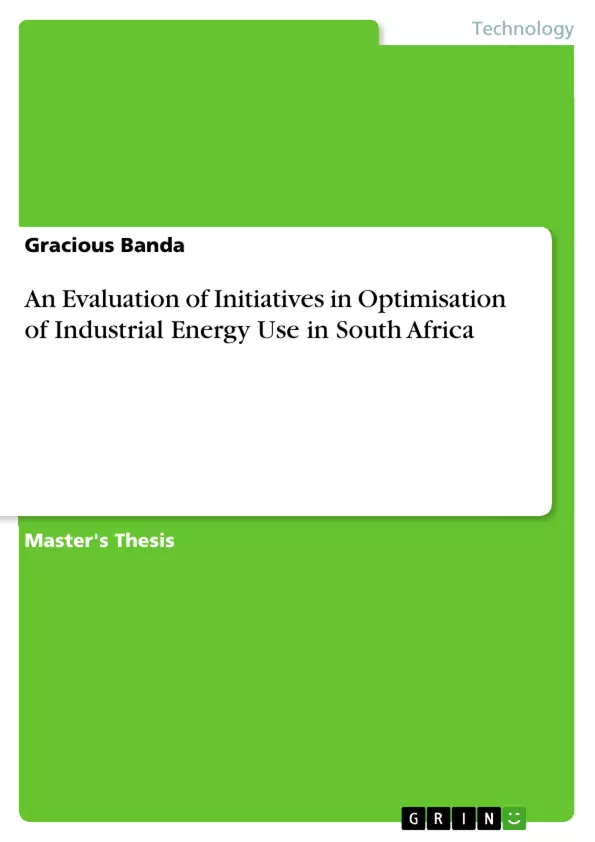Evaluation of industrial energy use optimisation in this project has been approached by introducing the aims and objectives of the project and asking questions about the research which seeks to establish how various industries from different sectors utilise energy in their industrial processes. This is an action research which specifically focuses on the manufacturing, mining and Commercial industry sectors. Literature has been searched and reviewed based on global, continental and national practices through exploration of different perspectives and practices by experts and practitioners in the field of energy efficiency as well as academia. General reflection and selection of reference documentation has been governed by the problem statement and relevant literature considered to provide answers to the research questions posed. The adopted approach model framework is based on O’Leary. The mixed methods approach combining both qualitative research and quantitative research has been adopted. This has been achieved by designing and introducing a research model framework as well as adopting existing approaches for execution of energy audit activities. The designed research model framework has been utilised throughout as a significant guide in writing this thesis whilst existing model frameworks based on industrial current best practices and standards have ensured writing in consistency with internationalised standards. Based on forty-four firms from a combination of industry sectors of manufacturing, mining and commercial, the analysis and evaluation of data has entailed a tactic of picking one firm from each of the sectors, collection of the tariffs and monthly bills of up to a year, consolidation of the same and then interpret and analyse these in order to draw meaningful statistical inferences that point to available opportunities in industrial systems energy utilisation, the identified opportunities being tabulated in relation to each of the three firms selected representing a sample statistic out of the forty-four audited.
This thesis investigates the current perspectives, culture, practices, technologies and approaches in industrial energy utilisation as its specific subject matter. It is envisaged that this study will predictively test the result of such activities and then prove them against the fulfilment of the specified objectives and set out a theme for the outcomes to be reliable and validated for any desired future academic or industrial use.
Inhaltsverzeichnis (Table of Contents)
- Declaration of originality
- Acknowledgement
- Abstract
- Table of contents
- Glossary of terms and abbreviations
- Overview
- Statement of the Problem
- Rationale
- Chapter 1 Introduction
- Overall Research Aim
- Background Information
- Value of this Research
- Objectives
- Research Questions
- Chapter 2 Literature Review
- Introduction
- Forces driving the Modern approach
- Challenges and Barriers
- Approach Models
- Significance of models
- Journal Reviews
- Summary and arising issues
- Chapter 3 Methodology and Research Methods
- Introduction
- Research Strategy
- Research Execution Plan
- Research Framework
- Research Methods used
- Research Design
- Data Collection
- Planning and organising energy audit activities
- The Energy Audit Process
- Onsite and Field Activities summary (portfolio of evidence)
- Description of the energy audit process steps followed
- Partial physical data from a few of audited firms
Zielsetzung und Themenschwerpunkte (Objectives and Key Themes)
This action research project aims to evaluate initiatives in optimising industrial energy use in South Africa. The research focuses on establishing how various industries from different sectors utilise energy in their industrial processes, specifically targeting the manufacturing, mining, and commercial sectors.
- Evaluation of industrial energy use optimisation practices in South Africa
- Identifying and analyzing energy use patterns across different industrial sectors
- Exploring potential opportunities for improving energy efficiency in industrial processes
- Developing recommendations for improving energy utilisation and reducing energy waste
- Assessing the effectiveness of implemented energy efficiency recommendations
Zusammenfassung der Kapitel (Chapter Summaries)
Chapter 1 introduces the project by outlining the overall research aim, background information, value of the research, objectives, and research questions. Chapter 2 delves into the literature review, examining forces driving the modern approach to energy efficiency, challenges and barriers, and approach models. The chapter also discusses the significance of models and provides journal reviews, concluding with a summary of key issues.
Chapter 3 focuses on methodology and research methods, outlining the research strategy, execution plan, framework, methods used, design, data collection, and the energy audit process. The chapter also provides details on planning and organising energy audit activities, as well as a summary of onsite and field activities and a description of the energy audit process steps followed.
Schlüsselwörter (Keywords)
This project centers on the evaluation of industrial energy use optimisation practices in South Africa. Key keywords include industrial energy, evaluation, optimisation, energy efficiency, energy audit, manufacturing, mining, commercial, research methods, operations and maintenance.
- Quote paper
- Gracious Banda (Author), 2017, An Evaluation of Initiatives in Optimisation of Industrial Energy Use in South Africa, Munich, GRIN Verlag, https://www.grin.com/document/379357



